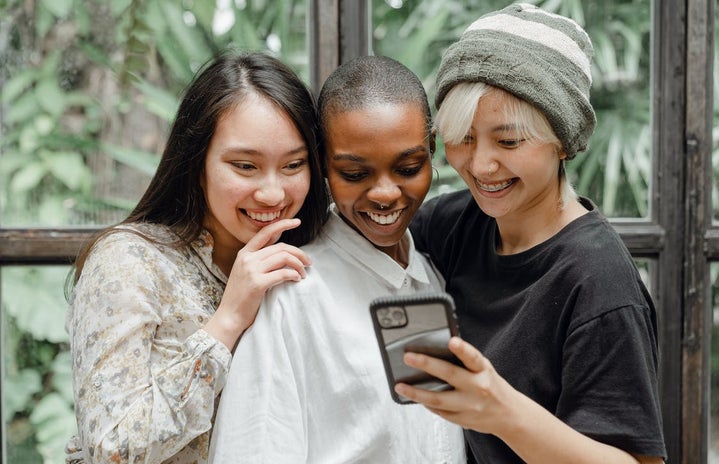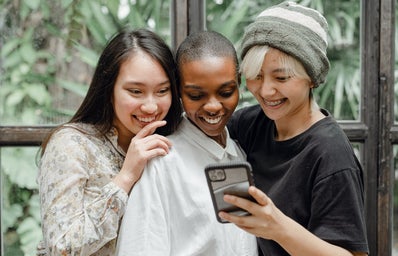If you’ve been on TikTok in the past few weeks, you’ve probably seen the viral #couchguy video of a girl surprising her long distance boyfriend at his college dorm. When the original user, Lauren Zarras, enters the room, her boyfriend gets up from the famous couch where he had been sitting on with three other girls, and the pair share a hug. This clip of a seemingly normal and perhaps heartwarming moment almost immediately garnered a slew of comments mocking the awkwardness of the situation.
Viewers noted how the atmosphere changed as she walked into the room and the suspiciousness of her boyfriend’s rather unexcited reaction. Comments from users pointing out the girl’s naivety, like “girl he ain’t loyal” and “home girl is fighting for her life in these comments” flooded the comment section. Even major brands like Trojan Brand Condoms and Sour Patch Kids jumped in to capitalise on the video’s traffic.
The TikTok community instantly went to work on #couchguy. Exaggerated parodies of the reunion ridiculed its awkwardness and frame-by-frame analyses unpacked their body language with a bizarre fervour akin to that of private investigators. The trend, which now has over a billion views, was rather amusing at first — it seemed like everyone but Lauren unanimously agreed that her boyfriend was cheating on her based on that 15 second clip. However, upon delving deeper, one might consider the trend rather inane, even insidious.
The TikTok community bonding over a viral trend is nothing new, but they can often come at the expense of actual people. When do these ‘jokes’ encroach on harassment, cyberbullying, or doxxing? The unfortunate couple’s relationship has been plastered all over the Internet with no real facts and the Internet has made a public trial of it. Many commenters are testifying against #couchguy like witnesses in a courtroom, and fewer are defending Laura. Some are even constructing a timeline of their relationship, speculating the exact moment in which Lauren’s boyfriend started to lose interest in her based on her previous TikTok videos.
Even as Lauren and her boyfriend put up videos and comments defending themselves, the community remained hell-bent on pointing out Lauren’s apparent delusion under the guise of being concerned. It has been almost a month since the original video came out, but not one of her videos has gone unscathed by the wrath of the #couchguy discourse.
Why are people still so obsessed?
This isn’t a new phenomenon, nor is it exclusive to the Internet. Throughout history, people have loved drama and gossip — from the tragedy of Shakespearean plays to modern day reality TV. Gossiping is almost part of human nature, and some anthropologists argue that it’s actually an important social skill that allows us to connect with others. When we’re part of a gossip circle, we feel on the inside, part of the clique, and this sense of camaraderie and community can be addictive. We just want to belong, after all.
Schadenfreude, a German word that loosely translates to “harm-joy”, perfectly encompasses another reason for our obsession. According to historian Tiffany Watt Smith, schadenfreude is a pleasure gained from “fun silly” misfortune, which is less brutal than sadism that delights in directly inflicting pain onto someone else. With TikTok being an entertainment app dominated by Generation Z, most people don’t take the creators or content on it too seriously. Trends on the platform are therefore supposedly harmless, which is why people have no trouble leaving a snarky comment and watching someone else’s life become a trainwreck. With no real harmful consequences on themselves or others (or so it seems), there’s glee in witnessing someone else’s sorry plight without feeling too much guilt.
Perhaps our obsession also holds up a mirror to reveal a deeper sense of insecurity within ourselves. Why are some commenters being so insistent on the storyline of couch guy: the unloyal boyfriend and disregarding Lauren’s probably more accurate perspective? A possibility is that some of us may feel the need to concoct a storyline for others that makes us feel better about our own. The Social Comparison Theory posits that we tend to feel happier when we make downward comparisons of our lives with people who we deem worse off than us. In this sense, commenters may very well be projecting their own unhealed trust issues or feelings of jealousy onto the poor couple, instead of working through these issues.
Whatever it is, the Internet has provided a space for us to engage in these psychological processes on a larger scale, and it’s become so easy to ignore the ramifications that our participation has on real people. For example, beyond the online flack that Lauren and her boyfriend have been getting, the roommates featured in the video have spoken out about stalkerish behaviour of people living in the same building as them, including receiving notes about #couchguy under their door. If that’s not objectively creepy and overboard to you, I don’t know what is.
As I scroll through the hashtag almost a month after the original video, I feel sorry for #couchguy, and even sorrier for the Internet. It’s time to think about the kinds of trends we are partaking in, and maybe temper that schaudenfreude with a little more empathy.


